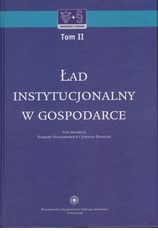LICHWA W ŚWIETLE WSPÓŁCZESNYCH UREGULOWAŃ PRAWNYCH W POLSCE I WYBRANYCH KRAJACH O ORIENTACJI RYNKOWEJ
THE USURY IN THE CONTEMPORARY POLISH LAW AND USURY LAW REGULATIONS IN SOME MARKET ECONOMY COUNTRIES
Author(s): Andrzej SołomaSubject(s): Business Economy / Management, Law on Economics, Commercial Law
Published by: Wydawnictwo Naukowe Uniwersytetu Mikołaja Kopernika
Keywords: Usury law; Contemporary Polish law; Market economy;
Summary/Abstract: From the legal point of view the usury rate is an abnormally high rate in relation either to a maximum rate set by the legislator or to certain principles, such as accepted standards of good behavior or fair business practices. Most UE states control usury practices a posteriori by jurisprudence. However, some countries (Italy, France) have an objective control system for usury. Cases of usury are present in the Polish economy during transition. The anti usury act was passed by the Polish Parliament in July 2005. Setting objective controls regulated the issue of usurious rates in Poland: rates cannot exceed four times the official pawn rate of the Polish Central Bank (as a “maximum interest”). Polish consumer credit regulations are designed to protect borrowers against unfair credit terms. Polish credit institutions should provide information about all the costs that the customer has to pay including interest and other charges. Anti usury regulations were criticized by the Polish Cabinet, the Polish Central Bank, financial institutions, and many Polish entrepreneur organizations.
Journal: Ekonomia i Prawo. Economics and Law
- Issue Year: 2/2006
- Issue No: 1
- Page Range: 289-304
- Page Count: 16
- Language: Polish

